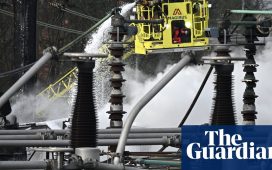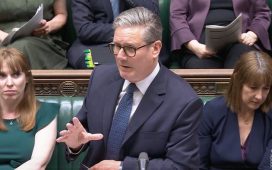Stay informed with free updates
Simply sign up to the UK energy myFT Digest — delivered directly to your inbox.
Ed Miliband has raised potential financial support for new renewable power projects to a record £1.56bn a year in a decision that follows intense lobbying from the clean energy industry.
The energy secretary has raised by 50 per cent the budget for this year’s subsidy contract auction, in which developers bid for 15-year state guarantees on their electricity price.
The guarantees are paid for by a levy on energy bills, with the actual amount paid out each year dependent on power prices at the time.
The decision follows industry warnings that power providers would struggle to meet current clean energy targets, and comes as ministers are trying to create the conditions to get wind farms off the ground as soon as possible.
About £1.1bn of the total will be allocated for offshore wind projects, as the government tries to make up for a flopped auction round last year when no offshore wind developers bid.
Miliband said last year’s auction was a “catastrophe”, adding that the new Labour government was “backing industry to build in Britain, with this year’s auction getting its biggest budget yet”.
Labour wants to quadruple offshore wind capacity, double onshore wind capacity and triple solar power capacity in order to meet its target of cutting emissions from electricity generation to net zero by 2030.
The target is five years faster than the goal set out by the former Conservative government, and experts say it would require radical change to the way projects are built in the UK.
In the UK, new renewables projects are typically supported by contracts-for-difference, or CFDs, under which the government guarantees that developers will get a certain price for the electricity they generate.
CFDs for renewable projects are auctioned each year, with a budget set for each auction round to make sure they remain competitive.
The budget amounts to an estimate of the annual costs of the 15-year contracts, but the actual costs could be higher or lower depending on power prices and other factors each year.
Developers do not get to keep the difference if wholesale power prices are higher than the guaranteed price agreed with the government, with the money returned to consumers.
The costs of building offshore wind projects has climbed over the past few years in large part because of higher interest rates and raw material costs, leading to setbacks for several projects around the world.
Offshore wind developers shunned last year’s auction round after complaining the level of support on offer was too low, meaning the government needs to award more contracts in this year’s round if it wants to keep renewable targets on track.
In March, Conservative ministers set the budget at £1bn for this year’s round, having already in November increased the price they were willing to offer for each unit of electricity produced.
The new Labour government, led by Sir Keir Starmer, has made rapid decarbonisation of Britain’s energy systems one of its main priorities and has vowed to accelerate the speed with which such schemes can be connected to the electricity grid.
Miliband has already announced changes to the planning system to make it easier to build onshore wind projects after Tory ministers in effect blocked the technology in England.
He has also granted construction consent to three contentious large-scale solar farms, and is drawing up plans to encourage more rooftop solar panels.










